Why Throat Hurts after Running? 3 Causes + 3 Treatment Tips
Author:
Unlock your full potential by engaging with our experts and community! Have questions about your fitness journey or looking for expert advice on weightlifting techniques? Don’t hesitate — leave a comment below and Oleksandr Zagrebelnyi will provide a personalized answer and insights to help you reach your goals.
Torokhtiy is reader-supported. Some links are affiliate links, and we may earn a commission at no extra cost to you. See our disclosure page for details.
Why does my throat hurt after running? Curious about this annoyance that follows your runs? Don’t worry! In this blog post, we will unveil the surprising reasons behind the post-run sore throat and share simple remedies for a smoother running experience. Let’s put an end to the mystery and bring comfort to your sore throat day after running.
Nasal obstruction, acid reflux, catarrh, dry air, and mouth breathing are common causes of sore throat after running. Solutions for an after-run sore throat include drinking warm liquids such as tea with lemon and honey, gargling with salt water, and using a humidifier in dry environments.
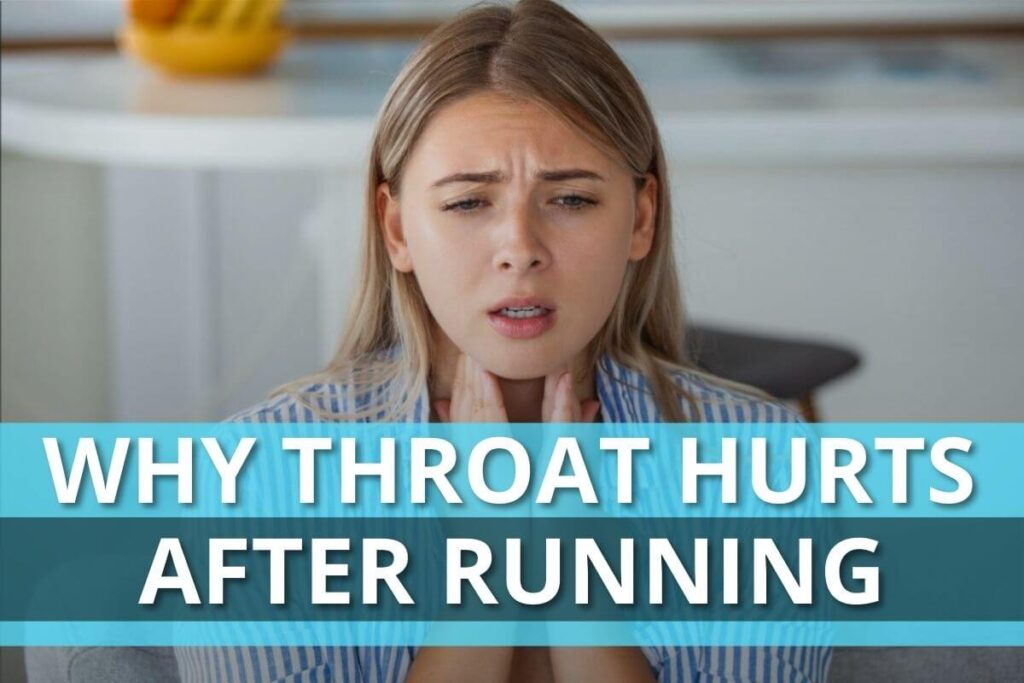
Why Does my Throat Hurt after Running?
Running is a great way to stay fit and healthy, but it can also cause throat pain. Throat discomfort can occur regardless of the weather or temperature – even after intense training sessions.
In most cases, this occurs from poor airflow through the nose due to nasal congestion caused by sinus problems or even a cold. This leads to mouth breathing, which dries out throat tissues creating an environment prone to irritation and infection.
Therefore understanding why you might be experiencing this common issue while running will help you identify how best to prevent and treat it.
3 Main Causes of Sore Throat after Running or Exercising
Let’s discuss the main reasons of a sore throat from running:
1. Nasal Obstruction
Nasal obstruction is a common cause of running sore throat and can be due to allergies, environmental asthma triggers, anatomical issues such as deviated septum or chronic sinusitis.
Allergies can lead to nonallergic rhinitis characterized by nasal congestion and drainage without itching in the eyes, nose, or throat. Postnasal drip caused by inflammation is also known to affect the throat and create additional mucus which generates further coughing and irritation associated with sore throats after exercise.
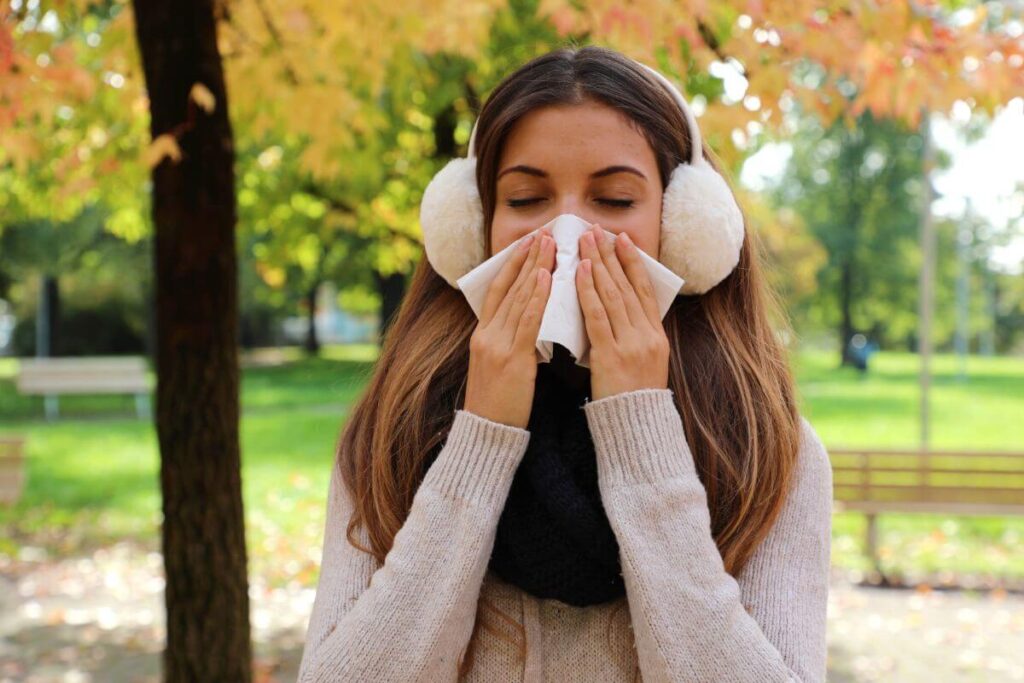
2. Acid Reflux
Acid reflux is also one of the main causes of sore throat after running or exercising. It occurs when stomach acid moves up into the esophagus, otherwise known as gastroesophageal reflux disease (GERD).
Symptoms of GERD include heartburn and a sore throat that may worsen with exercise. Other symptoms associated with acid reflux include difficulty swallowing (dysphagia), hiccups, hoarseness, wheezing or coughing persistent night time coughs, regurgitation during sleep, and ear ache.
3. Catarrh
If your throat hurts when running, it can be a sign of catarrh. It is a condition caused by the immune system reacting to an infection or irritation, leading to inflammation in the nose and throat lining.
Symptoms of catarrh are characterized by a persistent feeling of mucus stuck in the throat which may be accompanied by throat discomfort, coughing, and other symptoms like hoarseness.
Why Does my Throat Hurt while Running?
Find out more about the reasons for throat hurts after running in a cold:
1. Mouth Breathing
Mouth breathing is one of the most common causes of sore throat after working out due to stress on the airways. Allergies, colds, hay fever, or asthma can cause blockages in the nose and force a runner to inhale through their mouth.
But over time, this could lead to headaches, chronic sinusitis, or fatigue since the oxygen intake will be much lower than nasal breathing. Additionally, dry air circulating in cooler environments can affect vocal cords and cause them to become inflamed and irritated, leading to sore throats.
2. Environmental Factors
Environmental factors can lead to throat hurts after running. The intense heat that comes from a long run can also cause irritation in the throat.
Also, cold temperatures can lead to constricted blood vessels making it difficult for adequate oxygen levels to be attained which leads to fatigue and soreness in the muscles, including those that line the walls of your throat.
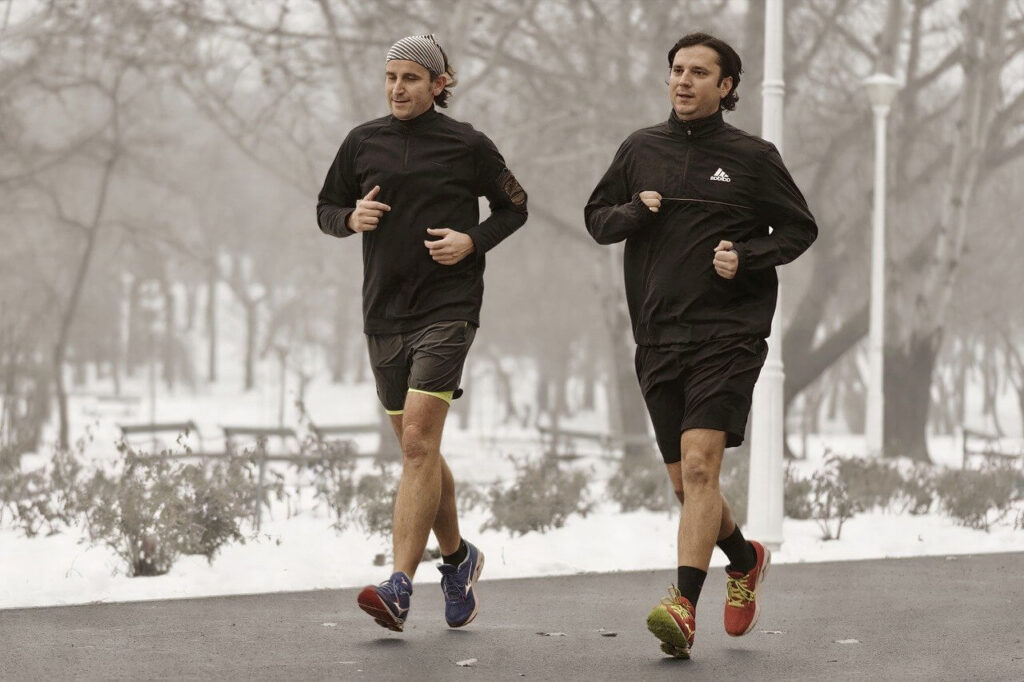
This soreness is known as ‘runner’s hoarseness’ and its intensity is based on how well your body copes with these environmental triggers during running.
Dry air can be one of the main causes of a sore throat during exercise. When we breathe in dry, cold air, our throats become exposed to irritants, leading to inflammation and discomfort.
Moreover, cold temperatures also reduce humidity which exacerbates throat irritation. Lower temperatures lead to faster evaporation resulting in less moisture for mucus membranes like those found in the mouth and larynx.
3 Possible Treatments for Sore Throat after Running
Let’s discuss some basic methods to get rid of your throat burns after running.
1. Gargle Warm Salt Water
Gargling with warm salt water is a well-known remedy for sore throats related to running. Saltwater gargles have hypertonic properties that can help soothe the throat’s discomfort and reduce pain.
Also, it works as an immune system booster, as the dissolved salt increases blood flow in the throat, which helps it heal naturally.
Pro Tip
To get optimal benefits of this natural remedy, dissolve half a teaspoon of salt into a glass of warm water and use it for regular gargles throughout your day. It is important to avoid swallowing any part of this solution – keep it in your mouth only!
Running Coach Nike Run Club Kyiv
2. Drink Warm Liquids
Drinking warm liquids, such as tea with lemon and honey, broth, or bouillon, can help to relieve dryness and discomfort caused by sore throat after running. Warm drinks have a soothing effect on the throat that helps to reduce pain associated with this condition.
Furthermore, the moisture in these beverages also helps to prevent dehydration which can aggravate a sore throat. Runners should avoid very hot liquids because they can irritate a sensitive throat.
3. Use a Humidifier
Try to add moisture to your indoor environment with a humidifier or vaporizer. Beyond relieving dryness, humidifiers can provide much-needed relief for post-run throat discomfort.
Humidifiers offer a practical solution to soothe sore throats after running.
By releasing water vapor, they effectively counter the dry air resulting from intense activity and temperature changes while simultaneously enhancing indoor air quality. Improve your running experience with this simple and effective remedy.
Is It Possible to Avoid a Sore Throat after Running: 3 Prevention Tips
These preventive measures can help to reduce the risk of developing a sore throat during running. Let’s discuss them in more detail.
Pro Tip
For this reason, runners must practice proper breathing techniques like inhaling and exhaling through their nose, as it can help reduce stress reactions and alleviate throat pain while running or exercising.
Running Coach Nike Run Club Kyiv
1. Breathe Through the Nose
Breathing through the nose during exercise is key to preserving lung function and preventing symptoms of a sore throat after running. Nasal breathing helps filter dust, allergens, and other external irritants from entering your lungs.
2. Avoid Caffeine, Alcohol, and Other Irritants
The consumption of caffeine and other related substances can lead to dehydration, making the throat more prone to post-running soreness and irritation. These substances also prevent the body from adequately replenishing electrolytes and other fluids lost after exercise which can cause additional strain on your throat and respiratory system.
Additionally, their use has been linked with increased risk of inflammation in the small airways which makes them even more sensitive when working out or running.
Some of these substances contain stimulants, which complicate runners’ attempts to control their breathing while exercising. As a result, mouth breathing becomes a common cause leading to throat pain after running.
3. Stay Hydrated
Staying hydrated is one of the most important things for runners to do in order to reduce their risk of developing a sore throat. A loss of fluid intake during exercise can occur from sweating. It means that replenishing lost fluids with water or another type of electrolyte-containing liquid, such as juice, should be done routinely.
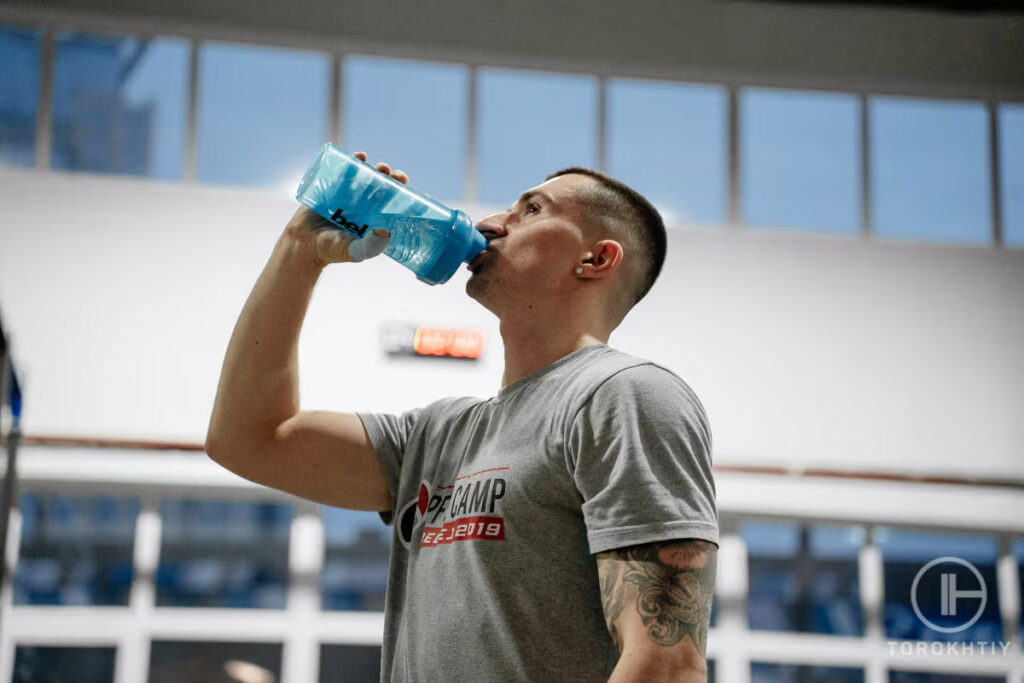
When to Seek Medical Attention?
It is advisable to seek medical attention if the sore throat persists or is accompanied by more severe symptoms such as difficulty breathing or swallowing.
1. Persistent Sore Throat
Running with a sore throat can lead to hoarseness, a burning sensation while swallowing, and discomfort. These symptoms are often caused by pharyngitis, an inflammation of the neck, and are commonly associated with viral infections.
Seeking appropriate medical attention can help identify potential causes of these conditions to receive adequate treatment methods accordingly.
2. Difficulty Breathing or Swallowing
Difficulty breathing or swallowing may also arise if the runner is dealing with an infection, such as strep throat. This condition presents symptoms like pain, fever, red and swollen tonsils, sore throat, and white patches.
Furthermore, nasal obstruction caused by colds or allergies can lead to irritation in the back of your throat, resulting in soreness during exercise. If you experience such symptoms, seeking medical help is advisable to address the issue promptly and ensure a comfortable workout.
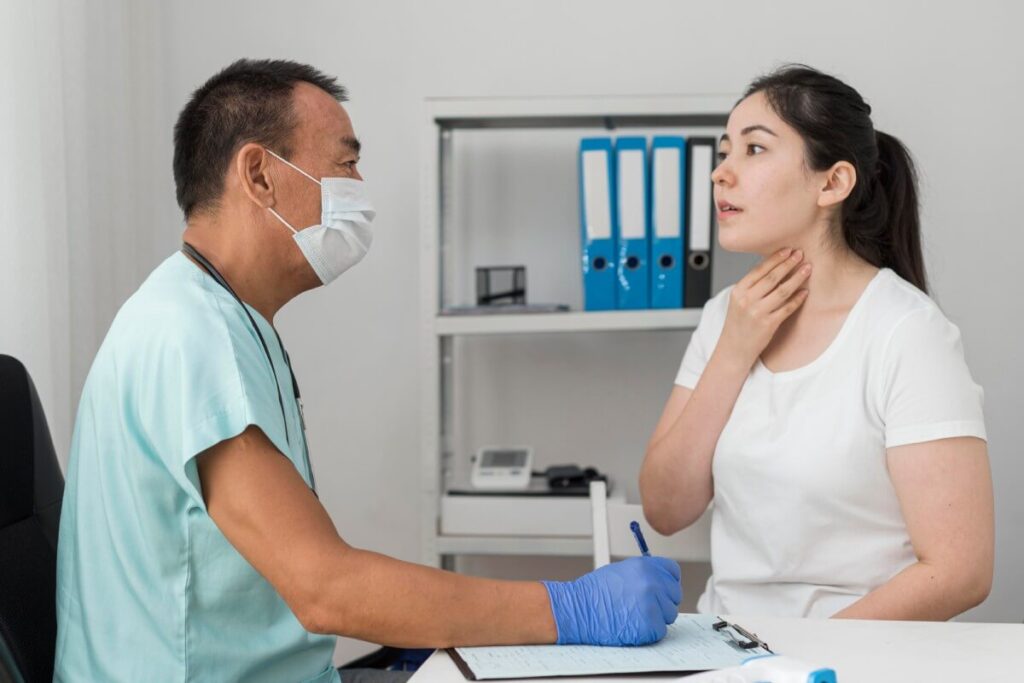
3. Other Accompanying Symptoms
Aside from throat pain, sore throats that occur following running may have other symptoms accompanying them. Due to the cold, some people may experience sneezing or a low fever when dealing with a post-run sore throat.
Individuals with infections like strep throat may also encounter more severe side effects, such as high fevers and other potentially serious complications. In such cases, seeking medical attention is advisable.
Hoka Bondi 8
- Material: Breathable and supportive mesh upper
- Sole Material: Full-length EVA midsole for maximum cushioning
- Outsole (tread feature): Durable rubber outsole with a unique lug pattern
- Drop: 4mm
- Season: Suitable for all seasons
- Special Features: Exceptional cushioning and comfort
- Size: Available in various sizes
- Type: Maximum cushioning running shoe
If you want excellent running or walking shoes or just footwear you’ll be comfortable in, you can’t go wrong with the Hoka Bondi 8.
It’s been upgraded and now they have lighter, softer materials and a new extended heel design. The heel design gives a super soft, balanced feeling from th emoment your heel hits the ground to when you push off with your toes.
As far as the weight goes, it’s around 10.80 ounces, and the heel drop is 4 mm. They’re not too heavy and the lower drop is a good balance between cushioning and feeling connected to the ground.
The Bondi 8 is focused on cushioning and keeps things simple. There’s a good amount of support without any extra stuff that you don’t really need and that would only jack up the price. Take the rear crash pad, for example – it makes for a soft, smooth ride, which is perfect if you like to run outdoors.

The upper part is made of engineered mesh, which is breathable and keeps your feet cool and dry. The tongue and collar have memory foam and mold to your foot shape. All of these features make the fit snug but flexible, which is exactly what you would want.
The Bondi 8 is eco-friendly because it uses recyclable materials in parts like the mesh and the sockliner. Plus, the shoes are completely vegan, which (if that’s important to you) is nice!
FAQ
Why Do I Have a Sore Throat after Training?
A sore throat after exercise can be a worrying symptom, but it is common, especially for runners who are not used to intense cardio. Nasal obstruction and acid reflux are two main causes of sore throats during exercise as they cause fluids and air to become trapped in the throat area.
Why do I Taste Blood While Running?
Tasting blood while running is fairly common and is associated with exercise intensity, duration, and certain environmental conditions. This metallic taste of blood can be caused by pressure in the lungs due to intense physical activity, or may even come from mucous membrane irritation.
Can I Have Sore Throat after Running in the Rain?
If your throat hurts after running in the cold, it may be due to the cold and wet conditions during a rainy run. During rain, various factors contribute to the discomfort of a sore throat.
The air tends to carry an influx of allergens suspended in rainwater droplets, and pollutants from the ground can rise up into the atmosphere. Both of these elements can worsen throat irritation and sensitivity.
Conclusion
Uncovering the root causes of post-run sore throats is vital for athletes. From allergies to infections, understanding potential triggers helps determine the best course of action. Moreover, seeking medical advice when symptoms persist is crucial to minimize risks associated with leaving the condition untreated. Share your experiences in the comments below.
Sore throats can be caused by many underlying conditions, ranging from allergies to infections. It is important for athletes who frequently experience throat pain after running or other activities to understand the potential causes and determine the best course of action when symptoms arise.
Seeking medical advice, if necessary, is essential in determining the cause of persistent soreness in order to reduce any potential risks associated with leaving such a condition untreated.
Have you ever experienced throat pain after running? Please share your thoughts in the comments below.
Also read:
References:
- How To Get Rid of Post-Nasal Drip // Health.com: https://www.health.com/condition/sinus-disorders/how-to-get-rid-of-postnasal-drip
- When to worry about a sore throat // Baylor College of Medicine: https://www.bcm.edu/news/when-to-worry-about-a-sore-throat
- Why Do I Get a Sore Throat When I Exercise? // Mount Sinai: https://health.mountsinai.org/blog/causes-of-sore-throat-with-exercise/
- Environmental and non-infectious factors in the aetiology of pharyngitis (sore throat) // PMC: https://www.ncbi.nlm.nih.gov/pmc/articles/PMC3439613/
- Sore throat // NHS inform: https://www.nhsinform.scot/illnesses-and-conditions/ears-nose-and-throat/sore-throat
- Do You Have Just a Sore Throat or Is It Strep? // Cleveland Clinic Health Essentials: https://health.clevelandclinic.org/strep-throat-sore-throat-best-ways-can-tell/
- Photos are made by Torokhtiy Media Team, stefanamer, Sergio Monti / EyeEm canvas, Surprising_SnapShots Pixabay, freepik Freepick
Why Trust Us?
With over 20 years in Olympic weightlifting, strength training, nutrition coaching, and general fitness our team does its best to provide the audience with ultimate support and meet the needs and requirements of advanced athletes and professional lifters, as well as people who strive to open new opportunities and develop their physical capabilities with us.
By trusting the recommendations of our certified experts in coaching, nutrition, and sports training programming, as well as scientific consultants, and physiotherapists, we provide you with thorough, well-considered, and scientifically proven content. All the information given in the articles concerning workout programming, separate exercises, and athletic performance, in general, is based on verified data.
The product testing process is described in more detail here.
Oleksandr is a running coach and member of the Nike Run Club coaching team for 8 years. A participant in national and international competitions at distances from one kilometer to the ultra trail. Owner of mountain trail running camps. Nowadays Oleksandr is responsible for creating running training programs for athletes of various levels, coaching personally offline and online, conducts trail running camps in the mountains, participates in competitions.



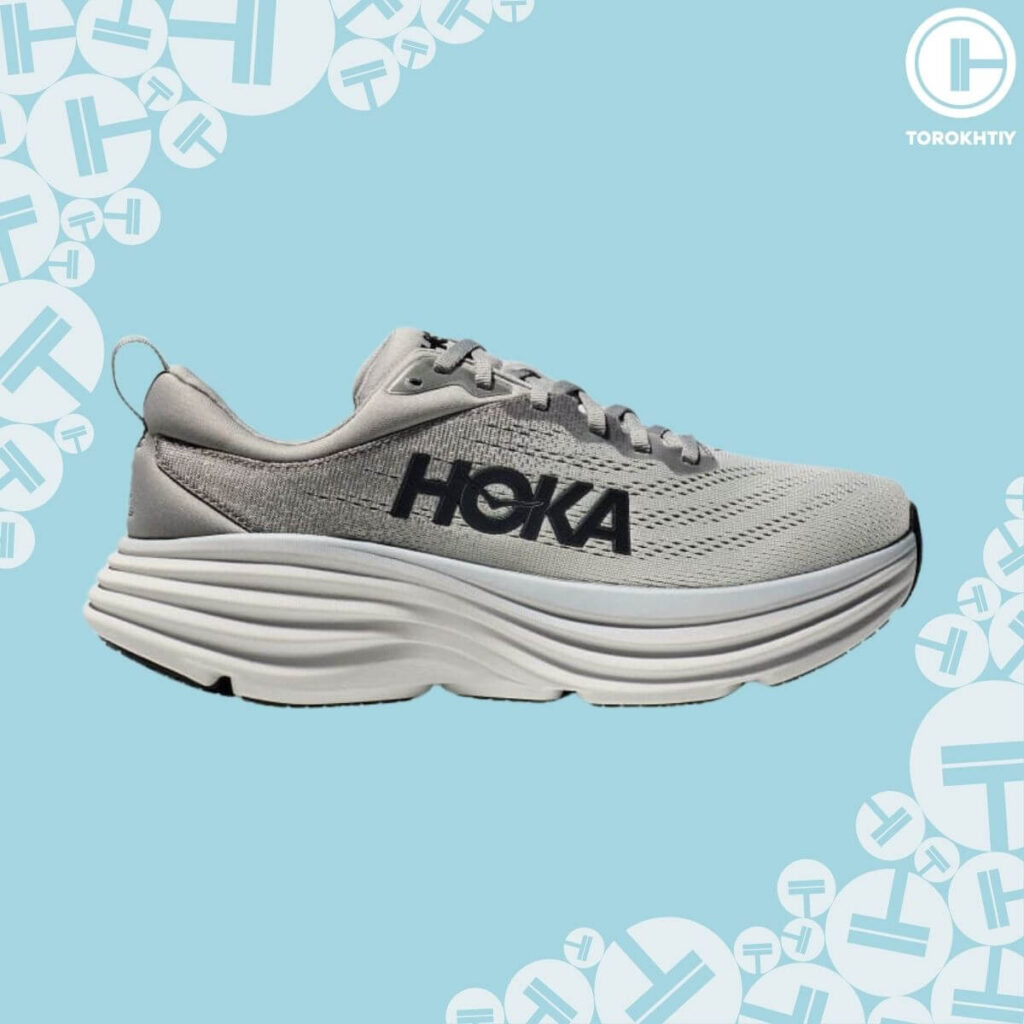
Still have questions after reading our article? Unlock your full potential by engaging with our experts and community! Don’t hesitate — leave a comment below and Oleksandr Zagrebelnyi will provide a personalized answer and insights to help you reach your goals.